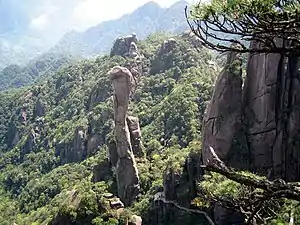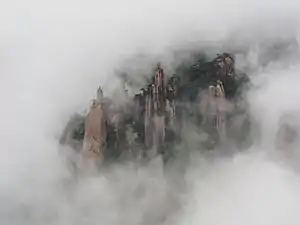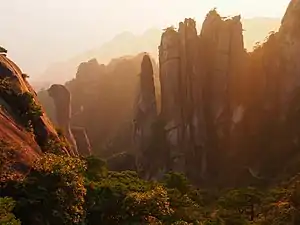Mount Sanqingshan National Park is a UNESCO World Heritage Site and UNESCO Global Geopark in Jiangxi.
Understand

The mountain has three major summits and its name indeed translates to "Three Pure Ones". The highest one, 🌍 Yujing (玉京峰), is 1819.9 m above sea level. The mountains are one of the 72 sacred Taoist "sites of happiness".
The mountain features spectacular rock formations and massive pillars, covered with twisted pine trees and ancient rhododendrons, and has several loops of broad concrete trail, in many cases attached to the side of a cliff. It's somewhat less crowded than similarly spectacular mountains, for the time being.
The park's total area is 229.5 km².
History
The mountain has been a place of Taoist worship for over 1500 years, and its remoteness protected it from the turmoil of the 20th century. The first ropeway was built in the 1990s, and the second about a decade later. It became a National Geopark in 2005, a UNESCO World Heritage Site in 2008, and a UNESCO Global Geopark in 2015.
Landscape
Sanqingshan is a mass of granite located on the Suzhou–Dexing Translithospheric Fracture Zone, an ancient plate boundary. The rock spans over a billion years of geologic history.
Flora and fauna
Climate
Get in
The national park is about 150 km southeast of Jingdezhen and 50 km northeast of Shangrao. From Yushan South (high-speed) railway station or Yushan Station take a bus or taxi to the Yushan bus terminal. Regular buses from there to hotel villages at the south and east entrances cost ¥17. There are ropeways that will take you most of the way up the mountain from the 🌍 south and 🌍 east. There is also a 🌍 trail under the south ropeway, and trail access from 🌍 two 🌍 points in the north, but to reach the northern trailheads you'll need to take a motorcycle taxi from the east entrance. In particular, the northeast entrance at Yuling Temple is not accessible by vehicles larger than a motorcycle due to a gate several kilometres below the temple.
Fees and permits
Park admission costs ¥150 most of the year, or ¥130 in January, with discounts for children, students, and seniors. A one-way trip up the ropeway is ¥70, and descending is ¥55.
Get around
Walk around on the paths. If the stairs get too difficult, you can pay to get carried up in a basic sedan chair.
See


Sanqingshan has a large number of strangely-shaped rocks and twisted trees. Many of the trees are ancient rhododendrons, so the mountain is covered in flowers in May.
The spectacular rock features are clustered mainly in the southern half of the mountaintop area. It is possible to hike over and around a number of large rocks in the 🌍 Longevity Garden, and perhaps the most famous stone pillar resembles a 🌍 giant python emerging from the mountain (巨蟒出山).
There's also an ancient Taoist temple, 🌍 Sanqinggong (三清宫), toward the north end of the mountaintop, with a series of sights arranged around it and with various carvings and gates on the path up the mountain to its entrance. This has been a place of Taoist worship for over 1500 years.
The old stone trail to the summit is not marked or maintained, but appears on most maps and can be climbed in under an hour. There is a small shrine at the top.
Do
The main activities here are hiking and admiring the rocks and trees.
Buy
Eat
Food is available in various places on the mountain, but in all cases it is expensive compared to the base of the mountain. The major hotels all have restaurants. Away from the hotels, there are several small huts selling snacks, instant noodles, and fried chicken.
Drink
Sleep
Lodging
There are a few hotels near the top of the south ropeway, and one near the top of the east ropeway. Small villages of hotels and restaurants are available at the base of each. There is also an 🌍 old guesthouse halfway up the trail that parallels the south ropeway. The hotels on the mountain tend to be expensive.
Camping
A number of places on top of the mountain offer camping, including near the 🌍 Jade Terrace (玉清台), which is famous for sunrise, and in front of Sanqinggong. Many of the hotels also offer tents. If you don't bring your own gear, you can rent a tent and bedding for ¥120-150 per night.
Backcountry
Stay safe
Stay on marked trails. Be prepared for rapid weather changes and colder temperatures than at the base of the mountain.
Go next
Consider visiting the small old towns and terraced fields of Wuyuan, or the old villages of Hongcun and Xidi. Huangshan is also nearby if you want to see more rocks and trees.